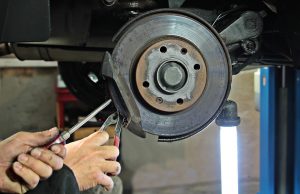 Taking your car to get serviced once a year is not always enough to ensure your safety on the road. It’s imperative that your car’s brakes are always in good working condition, and there are certain steps you can take to ensure they are optimally stopping your vehicle.
Taking your car to get serviced once a year is not always enough to ensure your safety on the road. It’s imperative that your car’s brakes are always in good working condition, and there are certain steps you can take to ensure they are optimally stopping your vehicle.
Listen to the Signs
Even if you’ve had your brakes checked recently, it doesn’t mean that you won’t experience brake problems. There are certain tell-tale signs that you should heed, as these are sure indications that all is not well with your brakes. These include:
- Your car veers to the left or the right when you apply the brakes.
- Your brake pedal pushes further into the floor when braking.
- Your steering wheel is shaking.
- You hear unusual sounds when braking.
- Your car pulsates when driving at high speeds.
Understand How the Brake System Works
Having a basic understanding of how the brake system works can be helpful when it comes to noticing possible issues with your brakes. Basically, when you press on the brake pedal, friction is created by the brake pads that, in turn, clamp down on the brake disks to stop the wheels from spinning. The brake disks also prevent the brakes from overheating by dispersing heat throughout the vehicle. Break fluid, on the other hand, is responsible for keeping the various components of the brake system moving.
Have Your Brake Pads Checked
As brake pads rub against the brake disks, they eventually wear out. For this reason, you want to have this component of the brake system checked regularly. It’s advisable to do so at least twice a year. An obvious sign that your brake pads need replacing is if you hear a high-pitched sound when applying the brakes. As people who live in urban areas tend to use their brakes more, they will need to replace their brake pads more often than those who live in rural areas.
Check Your Brake Fluid
It’s important to check your brake fluid periodically, as it is hygroscopic, meaning it attracts water. Moisture in brake fluid can cause all kinds of problems, such as corroding the metal components within the brake system. You can test for the moisture content by using a test strip. Just remember that brake fluid is toxic, so if you spill any, wipe the surface thoroughly and dispose of the rag. However, the best practice is to change your brake fluid according to the instructions supplied by the vehicle’s manufacturer. With most vehicles, brake fluid needs to be changed every two years.
Avoid Braking Continuously
How you drive will also affect the lifespan of your brakes. Brakes that are used continuously will wear faster. A precautionary measure you can take is to travel at a safe distance from the car in front of you so that you don’t need to break continuously every time they do. Secondly, when possible, coast before applying your brakes.
These are a few easy tips you can follow to ensure that your brakes are in good condition and will keep you safe on the road.
Image courtesy of Pixabay.com






